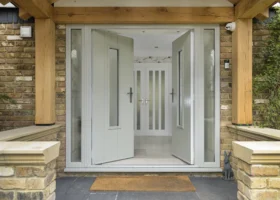Can I Save Money with a Builder’s Merchant?
Building your own home will, for many of you, represent the biggest shopping trip of your life. Even on modest projects you’ll be looking at material costs running into £10,000s – and in fact, most schemes will easily hit six figures.
Unsurprisingly, there’s no shortage of retailers waiting to relieve you of your hard-earned cash; but how can you decide where best to spend it? With the now ubiquitous presence of the internet offering up seemingly endless choice and frequently very competitive prices, why don’t we just buy everything online?
I’m going to explain why I would always recommend considering more traditional routes – and how you can get maximum value for money.
What are builder’s merchants?
Merchants have been around for as long as we’ve been constructing houses, but for many years they dealt almost exclusively with the building trades.
People in hard hats and rigger boots would drop in to order obscure items from racks with no prices displayed on them – and then charge the whole lot to a trade account for payment well into the future. In truth, it was all a bit of a closed shop. Regular clients could expect pretty hefty discounts.
Meanwhile, the casual customer looking to buy materials for a DIY project would only find out the true cost when the till spat out the invoice – and was happy to be able to buy at (apparent) trade prices at the whim of the merchant.
Market forces have opened up the merchants to the general public and there are now several national chains and independent builder’s merchants to choose from.
While they can still be somewhat daunting places for the uninitiated, nothing beats being able to see exactly what you are buying in advance – and things have moved on considerably in terms of customer service in recent years.
National or local?
The national chains have a huge presence in the UK and have been gradually taking over many of the independent builder’s merchants. A branch of Jewson, Travis Perkins or Wickes, for instance, can be found in all major UK towns.
They have the support network and range of goods that mean you can be sure of decent customer service but you might not have too much clout when it comes to negotiating discounts. This is because an individual self-builder cannot hope to compare with the buying power of larger developers.
Here, the independents can have the edge. If you have one close to you, the chances are the staff will have been there for a fair while. They will know the local area and routinely stock the materials favoured by the decision-makers in your council’s planning department.
You can always rely on the local merchants for speedy delivery of the bulk items such as sand, cement and aggregates. Moreover, the personal touch associated with independent suppliers can be exploited to foster a good relationship with the manager, whereupon discussions about discounts can follow.
For some materials, a specialist merchant is the best option. For example, a timber merchant is probably most suitable for roof trusses and joists, while suppliers such as Sheffield Insulation Group have dedicated staff to assist self-builders make the right choices from a vast array of insulation products.
The likes of Mike Wye Associates specialise in a wide range of eco materials, such as lime-based mortars and plasters that are not widely stocked by the national chains.
Trade accounts
As a rule, the more business you can offer to a merchant, the bigger the concessions you can expect. Don’t assume a blanket discount on everything you buy, however, because the margins vary enormously.
Setting up a basic trade card account is relatively straightforward and will offer around 10% off the standard price. Setting up a credit account might take a little longer and require a few checks but it is worth doing for each merchant you plan to use.
Take-off services
To make life easier for you, many builder’s merchants will offer a specialist take-off facility: you hand over your plans and they calculate the materials and the quantities you will require for free.
Of course, they’ll be expecting you to buy them, too. Some will offer other inducements such as a SAP calculation and an airtightness test for a discounted fee, in exchange for setting up an account.
If you have commissioned your own quantity surveyors’ report, then so much the better. While the service won’t come cheap, armed with this information you can negotiate prices based on known requirements.
It could even enable you to deal directly with the merchants’ reps who will be authorised to offer better discounts and, of course, are incentivised to create sales. Remember that any quotations will have a finite life. Materials prices change with the world markets so check how long any quote is valid for.
Negotiating deals
No retailer is going to want to turn down a potentially lucrative project, so use this to your advantage. Ask to meet with the manager of your local builder’s merchant and offer your business in return for reasonable discounts where possible.
Discuss the big-ticket items like bricks, tiles and timber frames first because these will have the longest lead times. Speaking of bricks, many kilns closed during the recession and renewed demand means that, in recent times, manufacturers have struggled to meet demand, especially for the special units so beloved of self-builders. So bear this in mind when ordering.
By all means shop around, but the promise of guaranteed business will usually prompt the best price if you ask for it. Merchants know that clients will trade one supplier off against the other, so the first deal may not be the cheapest – but they will be expecting to hear another merchant has offered a better price.
What are the alternatives?The internet has revolutionised the way we buy stuff, but it has never been geared to the supply of heavy-side items like bricks and roof tiles. Returning a defective delivery – or finding that the several tonnes of roof tiles, which looked lovely in the photo on the web page, are completely the wrong colour and having to send them back – is the stuff of nightmares. It’s far easier if the delivery has come from your local merchant, where there is someone you can talk to and a vehicle can be called in to collect unwanted items. It’s also an advantage to see and feel the detail and quality of products before you buy, something you simply can’t do online. However, the traditional merchants have had to up their game recently. This is primarily because some of the big DIY stores are targeting their customers by setting up trade desks There has also been pressure from overseas. The booze cruise of old has been replaced That said, the exchange rate is not helping people to take advantage of this option at the moment, so it is worth doing your homework before boarding the ferry with a hired van. |
The key thing to remember when seeking quotes is that you need to make sure you are comparing like with like; in other words, that you are pricing the same product at the same level of quality. Inferior items will undoubtedly be cheaper but may not offer genuine value for money – and it would be unfair to ask a merchant to match a quote on that basis.
Which merchant should I use?
So should you use a builder’s merchant for your project? For me, the answer is a resounding yes. Many firms have recognised the unique opportunities offered by the self-build market and have set up specialist departments to deal with our needs.
For the nationals, take a bow Jewsons, who have a dedicated self-build team and information pack available to order through their website.
For the independents, hats off to LBS in South Wales who won the Best Builder’s Merchant category in the Build It Awards 2017 for their dedication in meeting the needs of local self-builders and renovators.
The support these organisations can offer is bound to come in handy over the course of your scheme – but the discounts you can get are down to you and your relationship with the merchant. Send the business their way and haggle, haggle, haggle!



























































































 Login/register to save Article for later
Login/register to save Article for later
















